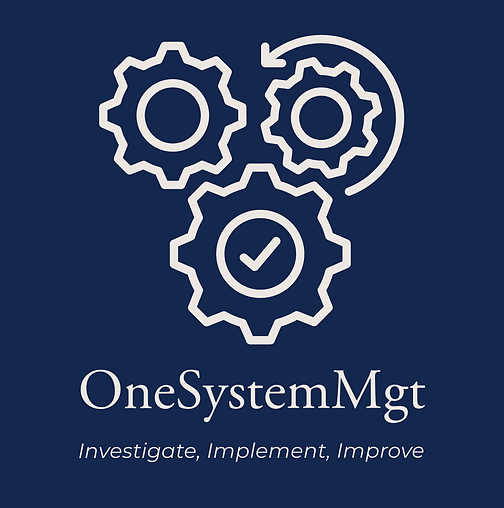How To Choose The Right ISO Standard For Your Business
- Danny Lee
- Feb 22, 2025
- 4 min read
Updated: Sep 6, 2025

How to choose the right ISO Standard
Choosing the right ISO certification standard for your business can seem like a daunting task.
With over 24,000 standards available, it’s crucial to identify which ones are most relevant to your industry, operations, and strategic goals.
This guide will help you understand different ISO standards, assess their relevance, and prioritise their implementation to gain the maximum benefit.
Why ISO Certification Matters
ISO certification provides a framework for consistency, efficiency, and compliance. Businesses that implement ISO standards benefit from:
Improved quality control – Ensuring products and services meet international standards.
Enhanced customer trust – Certification demonstrates a commitment to quality and reliability.
Regulatory compliance – Many industries require ISO certification to meet legal requirements.
Operational efficiency – Standardised processes lead to reduced waste and cost savings.
Competitive advantage – ISO certification can set you apart from competitors in tenders and contracts.
Understanding Different ISO Standards
To choose the right ISO standard for your business, you must first understand the most widely used ones. Below are key ISO standards and their applications:
1. ISO 9001 – Quality Management System (QMS)
Who should implement it?
Businesses of all sizes looking to improve quality, efficiency, and customer satisfaction.
Key benefits: Streamlined processes, improved customer service, and continuous improvement.
Industry relevance: Manufacturing, retail, service industries, construction, healthcare, and more.
2. ISO 14001 – Environmental Management System (EMS)
Who should implement it?
Businesses aiming to reduce their environmental impact and ensure sustainable practices.
Key benefits: Compliance with environmental regulations, reduced waste, and lower energy consumption.
Industry relevance: Manufacturing, construction, logistics, waste management, and energy sectors.
3. ISO 45001 – Occupational Health and Safety (OHSMS)
Who should implement it?
Businesses prioritising workplace health and safety.
Key benefits: Reduction in workplace accidents, improved employee well-being, and legal compliance.
Industry relevance: Construction, manufacturing, healthcare, and heavy industries.
4. ISO 27001 – Information Security Management System (ISMS)
Who should implement it?
Organisations handling sensitive data, including financial and personal information.
Key benefits: Protection against cyber threats, data integrity, and regulatory compliance.
Industry relevance: IT services, finance, healthcare, and government sectors.
How to Identify the Right ISO Standard for Your Business
Choosing the right ISO standard requires assessing your business needs, industry requirements, and strategic objectives.
Here’s a step-by-step approach:
Step 1: Assess Your Business Objectives
Consider what you want to achieve with ISO certification.
Do you aim to improve product quality, reduce environmental impact, enhance data security, or ensure workplace safety?
Identifying key business goals helps determine the most relevant ISO standard.
Step 2: Understand Regulatory Requirements
Some industries require specific ISO certifications for legal compliance.
Research industry regulations and contractual obligations to see if certification is mandatory or recommended.
Step 3: Analyse Customer and Market Expectations
ISO certification can enhance customer trust and improve market access.
Many clients prefer or require suppliers to be ISO-certified, making it a valuable asset in tendering processes.
Step 4: Conduct a Gap Analysis
A gap analysis helps identify areas where your current processes do not meet ISO requirements.
This allows you to determine the scope of implementation and prioritise key areas for improvement.
Step 5: Consider Business Size and Resources
Implementing an ISO standard requires time, effort, and investment.
Small businesses may benefit from starting with ISO 9001 before expanding into other standards like ISO 14001 or ISO 27001.
Prioritising ISO Implementation
If multiple ISO standards are relevant to your business, prioritisation is key. Here’s how you can approach it:
Start with ISO 9001
As a quality management system, it provides a solid foundation for implementing additional standards.
Address compliance-driven standards first
If regulations require ISO 27001 (data security) or ISO 22000 (food safety), prioritise these to meet legal obligations.
Consider industry expectations
Some certifications, like ISO 14001 or ISO 45001, are highly regarded in specific sectors.
Integrate multiple standards
If pursuing multiple ISO certifications, consider an Integrated Management System (IMS) to streamline processes and reduce duplication.
The Certification Process
Once you’ve selected the right ISO standard, follow these steps to achieve certification:
Learn the Standard’s Requirements – Familiarise yourself with the clauses and principles of the chosen ISO standard.
Develop Policies and Procedures – Establish documented processes that align with ISO requirements.
Train Employees – Ensure staff understand the new processes and their role in compliance.
Conduct Internal Audits – Assess compliance and identify areas for improvement before external audits.
Hire a Certification Body – Engage an accredited certification body to conduct the formal audit.
Achieve Certification – Upon passing the audit, your business will receive official ISO certification.
Maintaining ISO Certification
ISO certification is not a one-time achievement. Businesses must maintain compliance through:
Regular internal audits – To assess ongoing adherence to ISO standards.
Continuous improvement initiatives – Identifying and implementing process enhancements.
Surveillance audits – Conducted by certification bodies to verify compliance.
Employee engagement – Ensuring staff remain informed and involved in ISO processes.
Conclusion
Choosing the right ISO standard for your business depends on your industry, regulatory obligations, customer expectations, and strategic goals.
By understanding different ISO standards and prioritising their implementation, businesses can enhance quality, efficiency, and compliance, leading to long-term success.
Looking for expert guidance on ISO certification?
Contact us today to get started with the right ISO standard for your business.





Comments